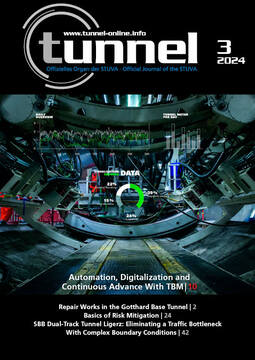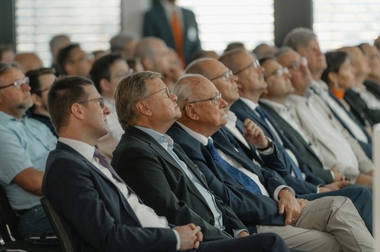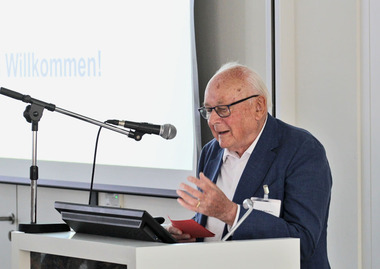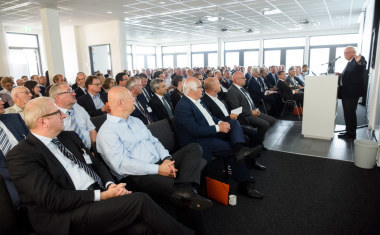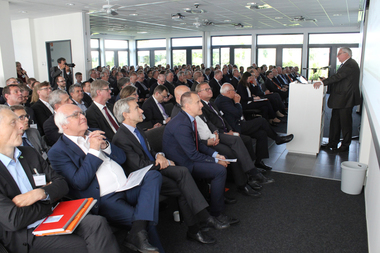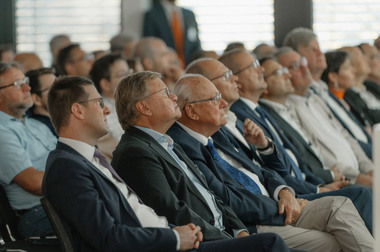9th Rock Mechanics and Tunnelling Day
On June 13, 2024, the 9th Rock Mechanics and Tunnelling Day took place at the WBI Center in Weinheim, Germany. This year, the very well-attended event focused on rock mechanics, tunnelling and underground construction, sustainability and project reports. It is organized annually by WBI GmbH, sponsored by the German Railway (DB InfraGO) and supported by the German Engineering Association (Arbeitskreis Bautechnik of the Württembergische Ingenieurverein).
Walter Wittke Prize 2024
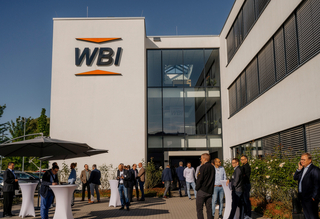 The Rock Mechanics and Tunnelling day is held annually in Weinheim. It is organized by WBI GmbH, sponsored by the German Railway (DB InfraGO) and supported by the German Engineering Association (Arbeitskreis Bautechnik of the Württembergische Ingenieurverein)
The Rock Mechanics and Tunnelling day is held annually in Weinheim. It is organized by WBI GmbH, sponsored by the German Railway (DB InfraGO) and supported by the German Engineering Association (Arbeitskreis Bautechnik of the Württembergische Ingenieurverein)
Credit/Quelle: WBI/Fotostudio Fischer
The Walter Wittke Prize is not only awarded for outstanding publications and projects from the construction or mining sector that represent progress with regard to recording the rock mechanical behaviour of fractured rock in terms of the AJRM (Anisotropic Jointed Rock Model). Furthermore, research projects in this field can also be funded. In this spirit of supportive, practice-oriented funding, the Walter Wittke Prize 2024 was awarded to the Institute of Soil Mechanics and Rock Mechanics (IBF) at the Karlsruhe Institute of Technology (KIT), which is part of the Department of Civil Engineering, Geo and Environmental Sciences; the prize was accepted by Institute Director Prof. Dr.-Ing. Hans Henning Stutz. The Walter Wittke Foundation aims to specifically promote the subject of rock mechanics, which is currently lacking in the German research landscape.
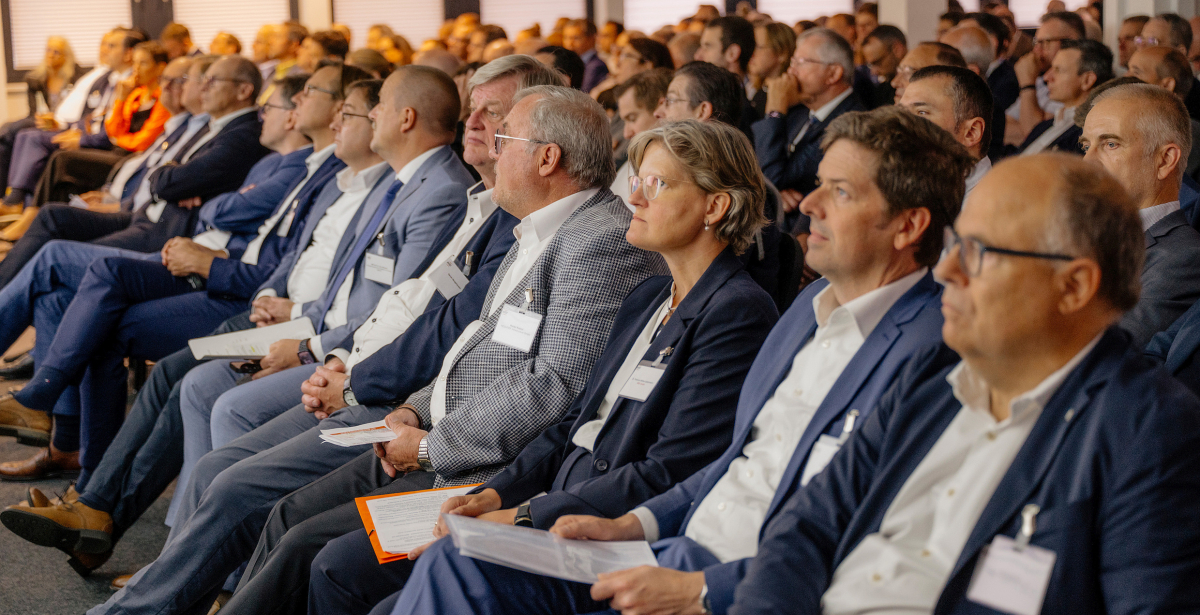 Full rows of seats at the WBI Centre: With around 270 guests, the Rock Mechanics and Tunnelling Day 2024 was once again well attended
Full rows of seats at the WBI Centre: With around 270 guests, the Rock Mechanics and Tunnelling Day 2024 was once again well attended
Credit/Quelle: WBI/Fotostudio Fischer
Rock Mechanics, Tunnelling and Underground Construction
This thematic segment opened with a presentation on the repair of the pressure shaft of the Wehr power plant, one of five pumped storage power plants operated by Schluchseewerk AG. In June 2023, an 80 cm long crack was discovered with accompanying bulging of the 35 mm thick armouring. Injection work was carried out from the pressure shaft over a grouting section of around 50 m before the armouring could be repaired with sheet metal.
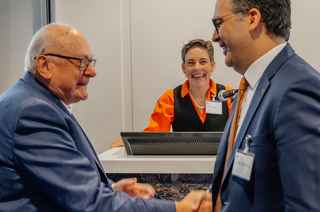 Prof. Dr.-Ing. Walter Wittke (left) opened the 9th Rock Mechanics and Tunnelling Day in Weinheim
Prof. Dr.-Ing. Walter Wittke (left) opened the 9th Rock Mechanics and Tunnelling Day in Weinheim
Credit/Quelle: WBI/Fotostudio Fischer
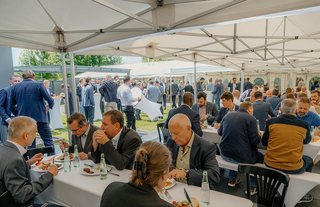 The breaks between the presentation sessions provided ample opportunity for expert discussions
The breaks between the presentation sessions provided ample opportunity for expert discussions
Credit/Quelle: WBI/Fotostudio Fischer
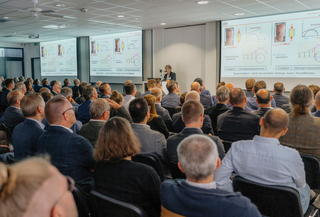 This year‘s expert conference focused on the topics of rock mechanics, tunnelling and underground construction as well as sustainability. Challenging construction projects were presented in a further programme section
This year‘s expert conference focused on the topics of rock mechanics, tunnelling and underground construction as well as sustainability. Challenging construction projects were presented in a further programme section
Credit/Quelle: WBI/Fotostudio Fischer
Dr.-Ing. Martin Wittke and Dr.-Ing. René Sommer from WBI GmbH contrasted tunnel planning using rock mechanical models with planning using classification methods. They argued that the latter are too simplified and do not take into account relevant rock mechanical properties, and that the Q system, for example, is based on case studies in which the sedimentary rock found in Germany is not adequately represented. In addition to expensive, and in some cases superfluous, support measures, the design with these systems in non-crystalline rock could in other cases also jeopardise the stability of the tunnel.
Further presentations in this block of topics dealt with the possibilities of single-shell permanent shotcrete lining for the renewal of old railway tunnels in Germany (Dipl.-Ing. Uwe Kneißl and Prof. Dr.-Ing. Walter Wittke) as well as a holistic view of TBM tunnelling in squeezing sedimentary rock (Dr.-Ing. Patricia Wittke-Gattermann and Dr.-Ing. Bettina Wittke-Schmitt).
Sustainability
The lecture block on sustainability focussed on the one hand on the handling of excavated soil material with regard to recycling options and regulations. On the other
hand, the potential for the construction of further pumped storage power plants in Germany was also presented – according to Dr.-Ing. Sebastian Palt from Fichtner GmbH & Co. KG, the potential here is much greater than generally assumed. Dipl.-Ing. Frank Haehnig, Managing Director of Bauer Spezialtiefbau GmbH, concluded the thematic block with a presentation on sustainable specialist foundation engineering.
Projects
Among other things, the current planning status of the Frankfurt mainline railway tunnel was reported on, including the presentation of different variants for the construction of the underground station and also different tunnel concepts with up to four bores.
M. Sc. Wirt.-Ing. Kerstin Wulfing from DB InfraGO AG explained the comprehensive data monitoring that is necessary for the construction of the 2nd S-Bahn main line in Munich: “After all, we are tunnelling the entire city centre of Munich – so there are many highly sensitive areas that require project-specific data monitoring.” This generates an extremely large amount of data from various disciplines, which is collated by the client DB InfraGO and made available for interpretation by the project participants.
The final project presentation was given by Dr.-Ing. Thorsten Weiner from Porr, together with Dipl.-Ing. Mathias Seibitz from TenneT TSO GmbH, on the ElbX tunnel project as part of the SuedLink project, whose 700 km direct current cable route can be regarded as a central component of the energy transition in Germany. The 5.2 km long cable tunnel with a diameter of 4 m is to cross under the Elbe by means of hydro shield tunnelling. The project has been under construction since September 2023. The SuedLink should be ready for the first energy flow from 2028.

